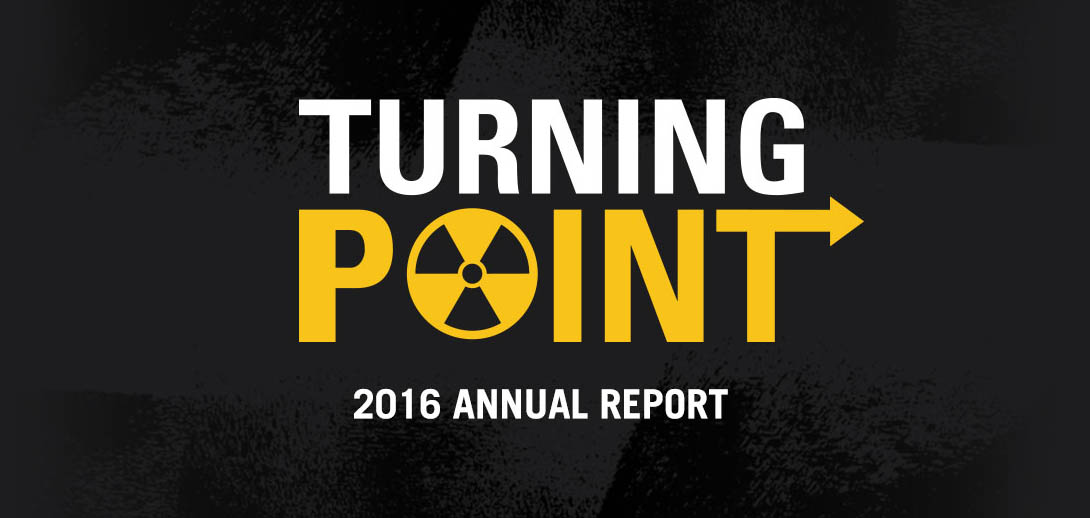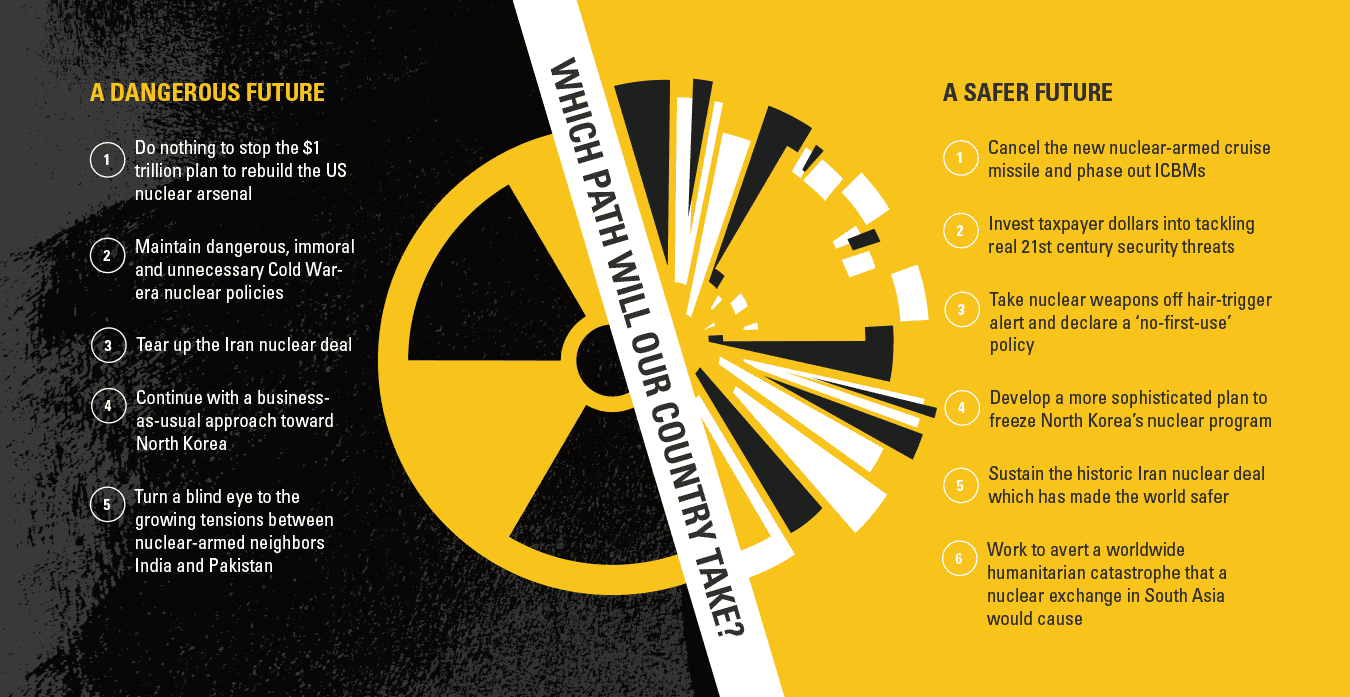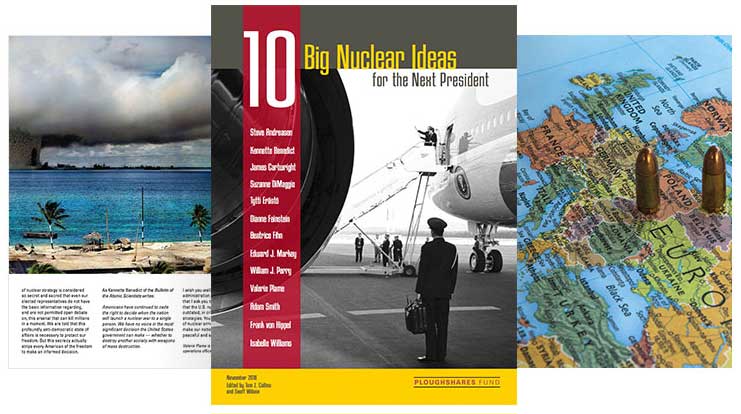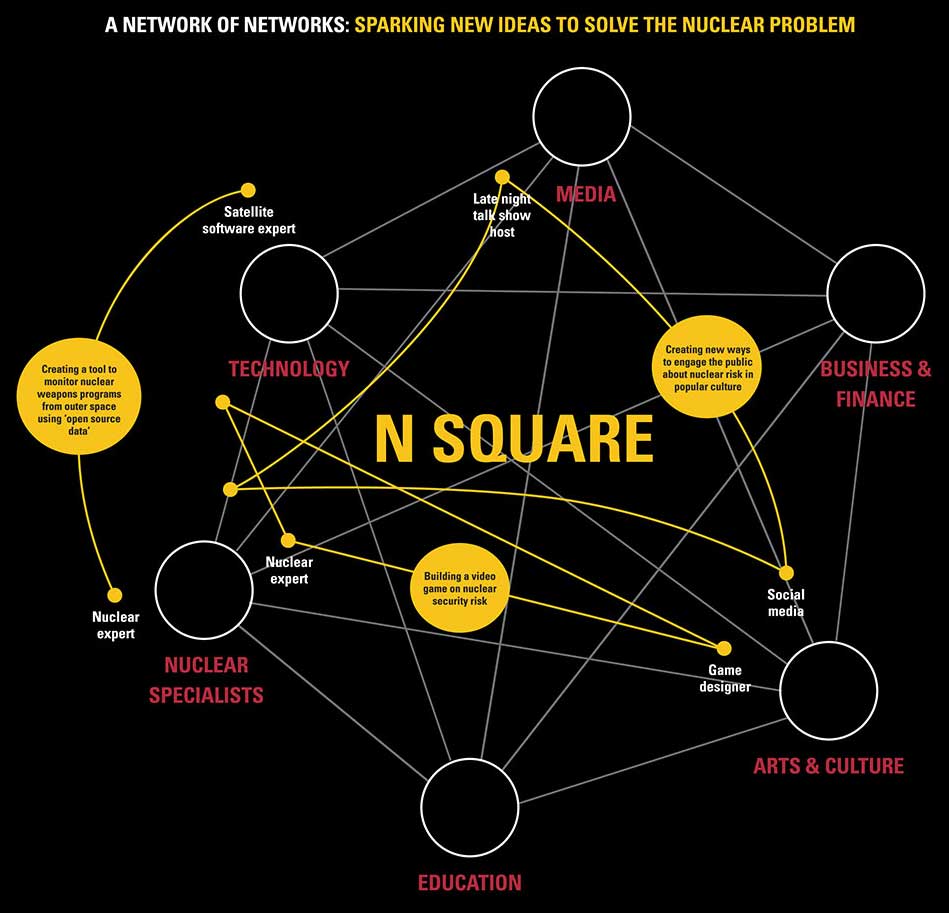2016 Annual Report

We are at a nuclear turning point
We are at a major turning point for nuclear policy. What happens today — and over the next four years — will affect the safety and security of everyone on the planet for generations to come.
Our mission is perhaps more critical now than at any point since the end of the Cold War. Along with our network of grantees, we began 2016 poised to defend the Iran nuclear deal. We remained nimble, reacting swiftly to new challenges that emerged like the growing threat posed by North Korea. Or sounding the alarm on the urgent need for saner nuclear polices – including those that would make it harder for any president to start a nuclear war. We’re redoubling our efforts in 2017. We kicked off the new year with an emergency response fund to address the new challenges the Trump administration presents, and to help us all move forward onto a path toward a safer world for all of humanity.

The Path to a Safer Tomorrow
In 2016, Ploughshares Fund spent $10 million to make the world safe from the dangers posed by nuclear weapons. Our investments supported – and continue to support – some of the brightest minds, best organizations and boldest new ideas on how to reduce nuclear risk. Here’s a snapshot of what we accomplished in 2016…
10 Big Nuclear Ideas for the Next President
Published just days after the election, Ploughshares Fund's latest report, 10 Big Nuclear Ideas for the Next President, provides valuable insight for the new administration on policies that would make the world safer from the dangers nuclear weapons pose.
It features a range of some of today’s greatest national security thinkers and leaders including former Secretary of Defense William Perry, Senator Dianne Feinstein (D-CA), Ret. General James Cartwright – once in charge of the US nuclear arsenal – and former CIA nuclear weapons expert Valerie Plame, just to name a few. Their combined wisdom on nuclear threats and how to reduce them is sorely needed at this critical turning point for our nation.

The diverse perspectives...are united around a common vision, one that Ploughshares Fund has embodied and promoted with exceptional clarity—if we want future generations to inherit a safer world, we must end our misguided approach to nuclear weapons.
—Senator Ed Markey (D-MA)
Promoting Saner Nuclear Policies
The policies we make today on nuclear weapons will have a profound impact on future generations. That’s why in 2016 we prioritized investing in some of the most effective groups and individuals working toward saner nuclear policies.
Our grantees are promoting strategies to stop a toxic 21st century nuclear arms race. They are showing that we can scrap unnecessary and unaffordable weapons like a new nuclear cruise missile. And they are advocating policies that make it more difficult for any US president to start a nuclear war – policies that unite and protect us all from the existential threat that nuclear weapons pose to humanity.

When Beatrice Fihn joined the International Campaign to Abolish Nuclear Weapons (ICAN) she knew she was taking the reins at an exciting time. Shortly after she took on the leadership role two years ago, ICAN helped mobilize civil society and governments around the Vienna Conference, where more than 120 countries pledged their support to stigmatizing nuclear weapons “in light of their unacceptable humanitarian consequences.” This pledge became official in October when 123 countries voted for a UN resolution to start the treaty process in 2017. A first-time grantee, Beatrice and ICAN have clearly brought valuable international perspective to Ploughshares Fund’s work.
“For seven decades, the UN has warned of the dangers of nuclear weapons, and people globally have campaigned for their abolition. Today the majority of states finally resolved to outlaw these weapons.”
— Beatrice Fihn, October 27, 2016

Sustaining the Iran Deal
More than a year after the historic Iran nuclear deal was struck by world powers, it is working despite a fierce opposition that claimed it never would.
Nonetheless, we are not taking this victory lightly; on the contrary, we know that immense challenges lie ahead. President Donald Trump and his cohort have threatened to rip up the deal. Ploughshares Fund and our partners continue to work tirelessly to defend the historic agreement, which has made America and the world safer without firing a single shot.

If you’ve heard of the Iran Project, it’s largely because Iris Bieri is behind the scenes moving many of its levers. Headed by Ambassador William H. Luers, the Project strives to reduce misunderstandings between Iran and the United States by establishing dialogues with Iranian counterparts. In 2016, the Project held events nationwide to discuss the implications of the nuclear agreement and to expand the policy conversation across America. As Deputy Director, Iris represents a growing number of millennial women working on the Iran deal and making a difference in shaping global security policy. You can bet you’ll be hearing more about her in the future.
“You have shown that well-conceived and tough-minded diplomacy can protect US national security interests. Given the stakes, the US will need more, not less, engagement with Iran.”
— Iran Project letter to President Obama signed by 75 national security leaders and published in Politico, July 11, 2016
Tackling the North Korea Threat
North Korea is fast becoming one of Ploughshares Fund’s top priorities. As with Iran, business-as-usual won’t keep us safe. Simply continuing past policies – applying more sanctions and beefing up military capabilities in the region – will almost certainly fail.
So in early 2016, we quickly shifted much of our focus to the growing North Korean nuclear threat. We are continuing to build on that momentum, supporting some of the country’s leading experts on North Korea to ensure their voices are heard loud and clear by the incoming Trump administration and Congress in 2017.


Joel Wit, who runs 38North at the US-North Korea Institute at SAIS, is the media’s go-to guy on North Korea. And for good reason. He’s been to North Korea multiple times and meets with North Korean officials whenever he can for “Track Two” dialogues. He provides consistent, timely and highly expert analysis of developments in North Korea based on satellite imagery and firsthand information from the ground. This is where Joel’s key value lies. He is shining much-needed light on the Hermit Kingdom not only for the media, but for the US government as well.
“The first hundred days in office will be critical for the next American president. If a window is open to curb North Korea’s nuclear ambitions, it may not stay open for long.”
— Joel Wit, New York Times, September 13, 2016

Bridging the Nuclear Divide in South Asia
South Asia is one of the most dangerous regions on Earth. Longstanding tensions between nuclear-armed neighbors India and Pakistan flared in late 2016 as the two countries clashed over the long-disputed region of Kashmir.
Addressing the root causes of conflict and supporting peacebuilding efforts in this potential nuclear tinderbox remains an important focus of our work. Our grantees are engaged in innovative activities centered on fostering cross-border communication, harnessing civil society’s voices to inform policy and bridging the divide of misunderstanding.

Samina Ahmed got the call a few months after 9/11. It was the International Crisis Group (ICG), which works to prevent and resolve deadly conflict, asking her to set up an office for Afghanistan and Pakistan. ‘When?’ she asked. ‘Yesterday,’ they replied. The rest is history: Samina, who previously worked on nuclear issues at Harvard, has spent much of the past 14 years gathering information for ICG in far-flung communities affected by conflict-related issues in South Asia. Her important work is helping raise the profile of lesser-known drivers of conflict between Pakistan and India, and ultimately preventing a conventional armed conflict from turning into nuclear war.
“I don’t think that anybody in their right mind would contemplate the use of nuclear weapons. But there’s a history of mistrust, a history of conflict and war…when you introduce nuclear weapons into that mix it’s incredibly destabilizing.”
— Samina Ahmed, 2016
N Square and Beyond
To advance the conversation about nuclear weapons and spark state-of-the-art solutions to the threat they pose, Ploughshares Fund has been exploring entry points for broader public engagement.
We are doing this through jointly-funded projects like N Square. Launched in 2014, N Square’s work has led to numerous new partnerships and activities, including TED talks, film premiers, hackathons, gaming challenges and salons across the country. It is now busy building networks of innovators from different sectors like technology, design, media and nuclear security and “cross-pollinating” them to create a new generation of thought leaders to solve this 71-year-old problem. We look forward to watching them bloom.


Daniel Pedraza believes in the power of big data – and in its potential for good. A native of Mexico, Daniel co-founded a San Francisco software startup that mines information from national databases to improve public health services for ordinary men, women and children in the Global South. Today, he works at UN Global Pulse, a United Nations big data initiative working to advance sustainable development and enhance humanitarian action. Daniel also sees potential in tapping big data to reduce nuclear threats. It is an issue close to his heart; his father is a former weapons inspector at the International Atomic Energy Agency.
“We’ve been on this path for 60 plus years. To make progress, yes, you need expertise. But you should also look for new ideas and bring in people that can help foster innovation and a new way to solve this wicked problem.”
— Daniel Pedraza, 2016
Download a pdf of the full annual report which includes additional content on:
- Our Leadership
- Grants & Grantees
- Donors
- Financials
